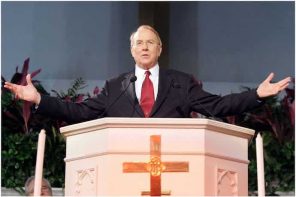As Sarah Posner pointed out earlier this week, Ryan Lizza’s much discussed article on Michelle Bachman in The New Yorker is at once important, for finally exploring the intellectual roots of the tea party and its candidates, but also flawed—in it’s underestimation of the real influence of RJ Rushdoony and the Christian Reconstructionists.
While Lizza does discuss both Rushdoony and Francis Schaeffer, he focuses primarily on Schaeffer. Frank Schaeffer (son of Francis Schaffer, and RD contributor), on the other hand, in both his recent book and a new piece at AlterNet, places a very strong emphasis on the central role of Rushdoony’s thinking in the intellectual foundations of the tea party movement.
The New Yorker piece focuses primarily on the roots of Bachmann’s views on homeschooling and on her recent gaffes (at least strategic gaffes) with regard to the issue of slavery. It’s often difficult to trace the lineage of the ideas presented by someone like Bachmann: there is a thin line between making too much of the ties among people because they have contact with each other and erring on the side of caution—thereby missing important influences .
But Lizza’s essay gives us a solid starting point for exploring Bachmann’s influences: her law school mentor John Eidsmoe. (“Solid” because Lizza quotes Eidsmoe saying he believes Bachmann’s views are in line with his own, and quotes Bachmann praising Eidsmoe.) What Lizza doesn’t do is show the degree to which Eidsmoe is influenced by Rushdoony and identifies as a Reconstructionist.
Lizza notes ties between Reconstructionist Herb Titus and Eidsmoe, but in fact, both the philosophical framing of the critique of public education to which Eidsmoe introduced Bachmann, and his views on slavery (which she keeps alluding to despite the chagrin of her staff), can be traced directly to Rushdoony. (I’ve written about them here and here.)
Eidsmoe is a regular speaker on the Reconstructionist’s conference circuit. I’ve had the chance to listen to him lecture at one of American Vision’s Worldview Superconferences (2010) as well as Vision Forum’s 2009 Reformation 500 conference. Eidsmoe’s schtick has to do with the biblical roots (Calvinist, actually) of the American political system and American Law.
At the American Vision conference, he presented a belabored discussion of what a church can and cannot do within the guidelines of the IRS rules. He cited the part of the code that prohibits influencing legislation and labeled it “legalese,” before a lengthy parsing of what counts as legislation and then what counts as influencing— none of which substantially departed from everyday understanding of those terms.
The talk sounded much like the “word study” sermon style found in many fundamentalist churches. He was careful to clarify that whether the rules permit certain activities or not, people can “do anything they want,” and that he was only explaining the IRS rules: “If one is called by God to some action, then that is between him and God,” he said.
But what was most interesting in his talk was the philosophical framing that precedes it— here he lays out his view of biblical authority rooted in limited jurisdiction (taken, by the way, from Rushdoony):
“(There are) two kingdoms… each has different responsibilities. The church’s responsibility is to teach biblical principles of government and to drive sinners to the cross by convicting them of their sins and to teach believers the principles of godly living. The function of the state is to follow those godly principles and preserve a system of order… but one law that governs both.”
“Religious authority is to be carefully guarded and kept from the state,” he adds, citing an Old Testament story. “When (King) Uzziah offers offerings (not in his jurisdiction) he is smitten by God with leprosy.” Eidsmoe speculates that every time Uzziah would reach out to sign something and see the leprosy on his hands he would be reminded: “KEEP YOUR HANDS OFF THE CHURCH.” If God would smite a faithful king with leprosy for merely making offerings, how much more will he judge a nation in which government utterly disregards the biblical limits on its jurisdiction?
Moreover, in one of his talks at Vision Forum’s 2009 conference, he presented a Calvinist teaching widely popular among Reconstructionists that when leaders depart from their biblically mandated and limited roles it is the duty of lower level officials (lesser magistrates) to “interpose” themselves between the people and those leaders.
This is the theological context in which Reconstructionists suggest that gun ownership is a biblical responsibility, and the tea partiers, who drink what Frank Schaeffer calls Reconstructionist’s “tainted water,” suggest “Second Amendment remedies” to perceived government tyranny—or, in short, idolatry.




